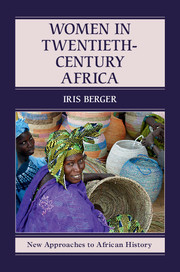Book contents
- Frontmatter
- Dedication
- Contents
- LIST OF ILLUSTRATIONS
- LIST OF MAPS
- PREFACE
- Map
- Introduction
- 1 Colonizing African families
- 2 Confrontation and adaptation
- 3 Domesticity and modernization
- 4 Mothers of nationalism
- 5 The struggle continues
- 6 “Messengers of a new design”: marriage, family, and sexuality
- 7 Women's rights: the second decolonization?
- 8 Empowerment and inequality in a new global age
- Contradictions and challenges
- REFERENCES AND FURTHER READING
- INDEX
Contradictions and challenges
Published online by Cambridge University Press: 05 May 2016
- Frontmatter
- Dedication
- Contents
- LIST OF ILLUSTRATIONS
- LIST OF MAPS
- PREFACE
- Map
- Introduction
- 1 Colonizing African families
- 2 Confrontation and adaptation
- 3 Domesticity and modernization
- 4 Mothers of nationalism
- 5 The struggle continues
- 6 “Messengers of a new design”: marriage, family, and sexuality
- 7 Women's rights: the second decolonization?
- 8 Empowerment and inequality in a new global age
- Contradictions and challenges
- REFERENCES AND FURTHER READING
- INDEX
Summary
In her play A New Earth, inspired by local ritual, Cameroonian writer Werewere Liking dramatically portrays women's contradictory feelings of power and oppression. So, the female protagonist, expresses these ambivalent views of her life in the opening scene:
“This is where I live out my life. Static, but coiled, ready to overflow from the calabash enclosed in a much too small container…
This is where I live out my life, bubbling with energy which gushes from me like lava from a crater, like resin from the pores in the barks of the trees, hollow and unnoticed…
Oh yes! I, slave-girl, wife of Ntep […]
This is where I drown my life in a torrent of unexploited juice, under the weight of stifled talents. Ah, why could resin not be active energy, and my blood be combustible oil?”
During a century of dramatic and sometimes explosive transformation, women's lives retained this tension between strength and vulnerability. They continued to carry the weight of a continent on their backs, while resisting men's efforts to curb their independence, confidence, and sexuality.
With the steep population decline that accompanied the early years of European conquest, women became the focus of conflicting strategies for restoring African societies. Perpetually short of labor and anxious to transform personal life in line with European notions of “civilization,” colonial powers often blamed the demographic crisis on local coming-of-age and birthing practices, which they depicted as “immoral.” In condemning women's behavior, missionaries and colonial officials were joined by African men, who favored strengthening customary law to maintain control over young women. African women forged their own strategies for renewal, however. Healers founded new religious movements and transformed older ones. Women also creatively adapted their economic lives to the new cash crop and migrant labor economy, tested the boundaries of both colonial and customary law, and staged collective protests against policies that threatened their ability to care for their families.
As educational opportunities expanded for both girls and boys in the years following the Second World War, increasing numbers of women began to embrace new identities. Eager to shed earlier condemnations of their “immorality,” many women learned skills in cooking, home decorating, and child care associated with being “modern” and “respectable.” They also turned their collective power to organizing separate women's protests.
- Type
- Chapter
- Information
- Women in Twentieth-Century Africa , pp. 199 - 204Publisher: Cambridge University PressPrint publication year: 2016

